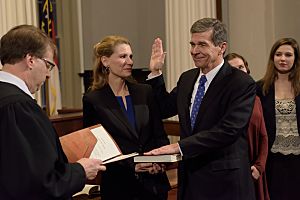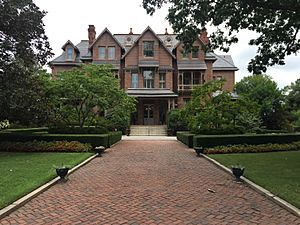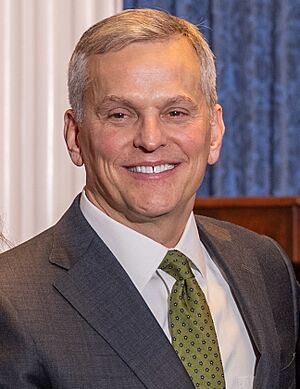Governor of North Carolina facts for kids
Quick facts for kids Governor of North Carolina |
|
|---|---|

|
|

Gubernatorial seal
|
|
| Government of North Carolina | |
| Member of | Council of State |
| Residence | Executive Mansion (primary) Western Residence (secondary) |
| Seat | Raleigh, North Carolina |
| Term length | Four years, renewable once consecutively |
| Constituting instrument | Constitution of North Carolina (1776) |
| Formation | January 16, 1777 |
| First holder | Richard Caswell |
| Succession | Line of succession |
| Deputy | Lieutenant Governor of North Carolina |
| Salary | US$203,073 per year (2025) |
The governor of North Carolina is the main leader of the government for the U.S. state of North Carolina. Seventy-five people have served as governor since the first one, Richard Caswell, started in 1777. The governor serves for four years. They also lead the Council of State, which is a group of other elected state officials.
The governor's powers and duties are set by the state's constitution and by law. They are the state's chief executive, meaning they are in charge of making sure state laws are followed. The governor is also the commander in chief of the North Carolina National Guard and manages the state's budget. They can appoint some officials and judges. Governors can also grant pardons (forgive crimes) and veto (reject) laws passed by the state legislature.
Historically, North Carolina's governor had less power compared to governors in other states. For example, they cannot reject just one part of a bill (a line-item veto). Other elected officials on the Council of State also have their own powers. Even though North Carolina has become more politically competitive, the governor's office has often been held by Democrats. The current governor, Democrat Josh Stein, began his term on January 1, 2025.
Contents
How the Governor's Role Began
Early Leaders in Colonial Times
The job of governor is the oldest public office in North Carolina. Its history goes back to 1585, when Ralph Lane was named governor of the Roanoke Colony. From 1622 to 1731, governors of the Province of Carolina were chosen by the colony's owners, called lords proprietors.
After 1731 and until 1774, the governors were picked by the British Crown (the King or Queen of Britain). These early governors had limited power. They usually followed the wishes of those who appointed them. They had an advisory group called the Governor's Council. This council also acted as the upper part of the state legislature.
After 1731, the council members were chosen by the Privy Council in Britain. This made the governor's power even weaker. British officials often sent secret instructions to the governors. These rules covered almost everything about how the colony was run.
These instructions often caused problems between the governor and the General Assembly. The Assembly controlled the colony's money. They used this power to make governors compromise or ignore some British rules. This tension, especially with Governor Josiah Martin in the 1770s, helped lead North Carolina to break away from Great Britain.
Creating the State Governor's Office
North Carolina's first constitution in 1776 created the office of governor. The governor was elected by both parts of the General Assembly for a one-year term. They could serve no more than three terms in six years. To be governor, a person had to be at least 30 years old. They also needed to have lived in the state for five years and own a certain amount of land.
The constitution also created the Council of State. This group was meant to "advise the Governor." From the start, the governor's office had limited powers. This was because people feared a powerful leader, like the British colonial governors. The Council of State often limited the governor's power. Sometimes, the governor needed their approval before acting.
The governor could grant pardons and lead the state's military forces "for the time being." They could not appoint many officials, except for temporary ones when the legislature was not meeting. Richard Caswell became the first governor of the independent state on January 16, 1777.
In 1835, the constitution changed. It allowed people to vote for the governor directly for a two-year term. This gave the governor more independence from the legislature. Edward Bishop Dudley was the first governor elected by the people.
Changes After 1868

In 1868, North Carolina approved a new constitution. This extended the governor's term to four years but limited them to one term. The new constitution stated that the governor had "supreme executive power." It also gave the governor power to appoint officials with the Senate's approval. The governor's power to grant pardons was also confirmed.
The Council of State was changed to include other elected officials. The governor led the council's meetings but was not a formal member. In 1871, Governor William Woods Holden was removed from office through a process called impeachment. He was the first governor in the U.S. to be removed this way. He is still the only North Carolina governor to be impeached.
In 1875, the constitution was changed again. This change took away the governor's power to appoint officials whose jobs were created by state laws. This greatly reduced the governor's ability to appoint people.
Strengthening the Governor's Powers
In 1925, a law called the Executive Budget Act made the governor responsible for the state budget. During Governor O. Max Gardner's time (1929-1933), many changes were made. These changes brought state services under one control and created more appointed jobs. This made the governor's office more powerful.
In 1971, a new constitution was approved. It clearly stated that "The executive power of the State shall be invested in the Governor." This made the governor clearly the state's chief executive. The constitution also confirmed the governor's role in managing the state budget. The governor also became a formal member of the Council of State.
In 1977, the North Carolina constitution was changed again. This allowed governors to run for a second four-year term right after their first. This made the office more politically powerful. Another change allowed the governor to cut state spending if needed to keep the budget balanced.
In 1996, after a vote by the people, the governor was given the power to veto (reject) laws. North Carolina was the last state to give its governor this power. Mike Easley was the first North Carolina governor to veto a law in 2002. However, the state legislature has also become more willing to assert its own power. In 2018, the General Assembly greatly reduced the number of appointments the governor could make, from about 1,500 to 300.
How Governors Are Chosen

To be governor, a person must be a registered voter in North Carolina. They must be at least 30 years old. They also need to have been a U.S. citizen for at least five years. They must have lived in North Carolina for at least two years before the election.
The governor is elected every four years. Their term begins on January 1 of the year after their election. They stay in office until the next governor is sworn in. If there's a close election, the General Assembly decides who wins.
New governors usually take their oath of office in public ceremonies. These events often include celebrations like balls and parades. The governor can serve two terms in a row. There are no limits on how many non-consecutive terms they can serve. If the elected governor cannot take office, the lieutenant governor becomes governor. The lieutenant governor is elected at the same time as the governor but on a separate ticket.
What the Governor Does
Leading the State Government
The governor of North Carolina's powers come from the state constitution and laws. The governor is the state's main leader. They are responsible for making sure the state's laws are carried out. The governor can ask state agency leaders to report to them about their work.
They can also reorganize state agencies using an executive order. These orders become law unless the General Assembly rejects them. The governor is also the commander in chief of the North Carolina National Guard. They can call the Guard into service to enforce laws.
The governor can grant pardons (forgive crimes) and reduce sentences for convicted criminals. They also represent North Carolina in dealings with other states and the federal government. They handle requests from other states to return people who have committed crimes.
The governor is in charge of the state budget. They watch how much money the state collects and spends to make sure the budget is balanced. They also prepare budget ideas for the General Assembly. The governor also manages money and loans that the federal government gives to the state.
The governor can appoint officials in the executive branch, some judges, and members of state boards and commissions. As of 2024, the governor makes about 300 appointments. Many of these appointees serve as long as the governor wants them to. Some important appointments, like to the State Board of Education, need approval from the General Assembly.
The governor appoints the leaders (secretaries) of the state's Cabinet departments. These include departments like Administration, Commerce, and Transportation. These secretaries need approval from the State Senate. The governor can also appoint temporary officials to fill empty spots on the Council of State.
Working with Lawmakers

The governor must tell the General Assembly about the state's situation. They also recommend new laws. Governors usually do this with a "State of the State" speech at the start of the legislature's session. They can also send special messages.
The governor signs bills passed by the General Assembly to make them laws. They can also veto (reject) bills they don't approve of. The General Assembly can override a veto with a three-fifths vote. A bill can also become law without the governor's signature if they don't veto it. The governor can call the General Assembly into special sessions if needed.
Other Important Roles

The governor is one of 10 members of the Council of State. They lead the council's meetings. The council's main duties come from state laws. For example, they must approve when the governor buys or sells state property. The governor is also responsible for keeping the Great Seal of the State of North Carolina.
The constitution requires the governor to live in the state capital. Since 1891, the Executive Mansion in Raleigh has been the official home for the governor and their family. The governor and their family are seen as symbolic leaders for the state. They often attend official events and perform ceremonial duties. This includes meeting important people and leading ribbon-cutting ceremonies.
If the Governor Cannot Serve
If the governor is out of North Carolina or cannot do their job due to health, the lieutenant governor serves as "Acting Governor." If the governor dies, resigns, or is removed, the lieutenant governor becomes governor for the rest of the term. The governor can declare themselves unable to perform their duties due to physical health. They can resume duties when they feel capable again.
The Council of State can vote to call the General Assembly into a special session to decide if the governor is mentally able to serve. The General Assembly can declare the governor mentally unable with a two-thirds vote. They must tell the governor about this and let them speak before voting.
The only other way to remove a governor is through impeachment for a serious offense. If the North Carolina House of Representatives impeaches the governor, the chief justice of the North Carolina Supreme Court leads the trial. The State Senate acts as the jury. If two-thirds of the senators vote yes, the governor is removed from office.
North Carolina has a clear order of who takes over if the governor cannot serve. This is called the line of succession. It goes from the Lieutenant Governor to the President pro tempore of the Senate. Then it goes to the Speaker of the House. After that, it follows other elected state officials like the Secretary of State and State Auditor.
How the Governor's Office Works

The governor's main office is in the State Capitol. They also have other offices in the Administration Building. These offices will temporarily move before a new building is built near the governor's mansion. There are also regional offices in New Bern and Asheville. These offices help connect with local governments and people in different parts of the state. The Asheville office also manages the governor's western residence.
Another office is in Washington D.C.. This office helps the North Carolina government work with the state's members of Congress and the federal government. The governor has a security team from the North Carolina Highway Patrol. The General Assembly sets the governor's salary. It cannot be lowered during their term. In 2025, the governor's yearly salary is $203,073.
The leaders of the state's executive departments are called secretaries. They form the state cabinet. There are 11 cabinet departments. These include departments for Administration, Commerce, and Transportation.
The governor's office has a senior staff. They help the governor manage the cabinet and give advice on laws. As of January 2025, the governor's office has 85 employees. The governor appoints a legal counsel. This person advises the governor, cabinet, and Council of State on legal matters. They also look into requests for pardons.
The Office of State Budget and Management helps prepare the state budget. It also advises the governor on money matters. The Boards and Commissions Office helps the governor with appointments. The Communications Office handles press releases, speeches, and public events for the governor. The Policy Office creates the governor's main goals for the state. The Education Policy Office focuses on education matters. The Office of Constituent Services handles questions and letters from citizens. The Office of Citizen and Faith Outreach works with minority groups and religious groups. The Legislative Affairs Office connects the governor with the General Assembly. The Governmental Relations Office connects the state government with local and federal governments.
Political Influence
The Governor's Political Role
Governors usually act as the informal leader of their political party in the state. They can influence who becomes other party leaders. They can also support candidates and speak for their party. As a well-known elected official, the governor gets a lot of media attention. They can also influence what issues people talk about and how the public feels about things.
Who Has Held the Office

Between 1877 and 1972, all North Carolina governors were Democrats. The only exception was Republican Daniel L. Russell, who served one term starting in 1896. For a long time, governors were chosen from different parts of the state (east or west). This was an informal agreement by the Democratic Party.
As the Republican Party grew stronger after 1950, governor elections became more competitive. In 1972, James Holshouser became the first Republican governor of the 20th century. However, Republicans have still found it hard to win governor elections in North Carolina. The office has mostly stayed with Democrats. Since 1901, 23 Democrats and three Republicans have been elected governor.
Most North Carolina governors have been men. They were usually born and raised in rural North Carolina. They were about 50 years old, had political experience, were lawyers, and had a college education. Most have been white Christians. Bev Perdue, elected in 2008, was the first woman to be governor of North Carolina. Josh Stein is the first Jewish person to serve as governor. Governors who are already in office often win reelection. Jim Hunt served the longest as governor, with four terms from 1977 to 1985 and 1993 to 2001.
Limits on the Governor's Power
North Carolina's governor has less overall power compared to governors in other states. Their veto power is weaker. It can be overridden by a three-fifths vote in the legislature. Most states require a two-thirds vote. Unlike most governors, North Carolina's governor cannot use a line-item veto. This means they cannot reject just one part of a bill. They also cannot veto certain things like local bills or changes to the state or federal constitutions.
The fact that other state executive officials on the Council of State are elected separately also takes power away from the governor. These officials control their own areas of government. Also, the General Assembly can make some appointments to state offices. By law, the governor needs the Council of State's approval for some state property deals. When different political parties control the governor's office and the legislature (called divided government), it can also make the governor less effective.
Timeline
| Timeline of North Carolina governors |
 |
Lists
- List of colonial governors of North Carolina
- List of governors of the Province of North Carolina
- List of governors of North Carolina
- List of first ladies and gentlemen of North Carolina
 | Chris Smalls |
 | Fred Hampton |
 | Ralph Abernathy |



